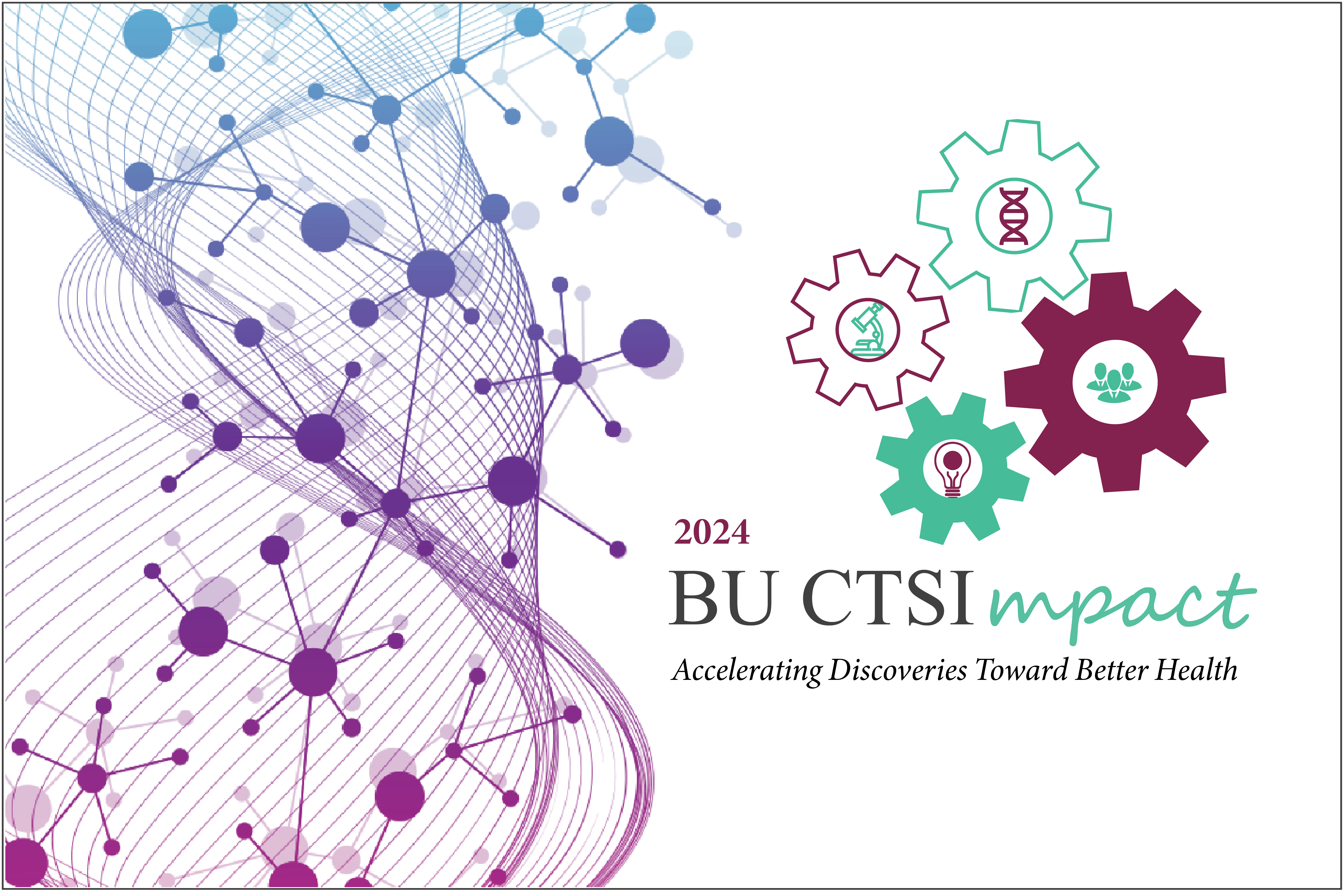
William Adams, MD
Dr. William Adams is an epidemiologist, medical informatician, and practicing pediatrician at Boston Medical Center (BMC). He is Professor of Pediatrics, BU-CTSI Director of the Biomedical Informatics Core (BU-BIC), and Director of Community Health Informatics for the Boston HealthNet. His research focuses on developing and evaluating information technology (IT)-based solutions for improving health and the quality of healthcare for urban populations, particularly children, and includes EHR-based technologies, patient-centered IT, immunization decision support, predictive analytics, clinical data warehousing, and research data networking.

Hugo J. Aparicio, MD, MPH
Dr. Aparicio is a clinician scientist studying stroke and vascular causes of dementia. He is an investigator with the Framingham Heart Study, BU’s Black Women’s Health Study, and the VA Boston Healthcare System’s cardiovascular epidemiology group. His research is on the effects of vascular and lifestyle risk factors on brain health, with a focus on differences seen by sex and race. His projects utilize longitudinal studies and multimodal blood and imaging biomarkers to improve risk prediction for stroke and cerebrovascular disease outcomes, including cognitive decline, dementia, and mortality.
Dr. Aparicio’s undergraduate degree is from Emory University, where he studied biology and Spanish. He received his MD and completed neurology residency at the University of Pennsylvania. During a vascular neurology fellowship at BUMC, he received an MPH from the Harvard T.H. Chan School of Public Health. His research is supported by the American Academy of Neurology, the Alzheimer’s Association, and the National Institute of Health.
 Tamar F Barlam, MD, MSc
Tamar F Barlam, MD, MSc
Dr. Barlam is the Chief of the Section of Infectious Diseases and Director of Antimicrobial Stewardship and Hospital Epidemiology at the Boston Medical Center. She is a Professor of Medicine at Boston University Chobanian & Avedisian School of Medicine. She has over 30 years of experience leading antimicrobial stewardship efforts at hospitals in New York City and Boston. Previously, she directed the Antibiotic Resistance Project at the Center for Science in the Public Interest in Washington, D.C. where she focused on antimicrobial use in food-producing animals. Dr. Barlam’s primary academic interest is examining and understanding prescribing practices by clinicians, as well as studying optimal implementation of antimicrobial stewardship programs across the spectrum of healthcare facilities. She is currently MPI for the AHRQ study, implementing telemedicine to improve appropriate antibiotic prescribing for acute respiratory tract infections. She led development of the IDSA/SHEA guideline, “Implementing an antibiotic stewardship program,” and was an editor of the SHEA-sponsored text, “Practical Implementation of an Antibiotic Stewardship Program.” She is the past chair of the SHEA Antimicrobial Stewardship Committee. Dr. Barlam is a Fellow of the Society for Healthcare Epidemiology of America and a Fellow of the Infectious Disease Society of America.

Tracy Battaglia, MD MPH
Dr. Battaglia is a physician-scientist internationally recognized for her collaborative and innovative approaches to addressing health disparities among women historically marginalized. As a practicing primary care physician and breast health specialist at Boston Medical Center, the largest safety net medical center in New England, her approach to addressing health inequities focuses largely on engaging the community as partners in action-oriented research. As Director of Community Engagement for the BU Clinical Translational Science Institute (CTSI), she is responsible for creating programs, policies, and training to support the use of community-engaged methods in all aspects of translational science. Her own research focuses on designing, implementing, and evaluating multi-level health system interventions in pursuit of equitable access to care for at-risk women, especially for cancer care. A pioneer in the development of oncology Patient Navigation programs that target under-resourced cancer patients, Dr. Battaglia has contributed to the scientific evidence solidifying the impact of navigation on reducing delays across the continuum of cancer care. She is currently leading a cooperative study funded by the National Center to Advance Translational Science (NCATS) in partnership with the four Massachusetts CTSI hubs to conduct a City-wide implementation study that aims to reduce breast cancer inequities through a patient navigation network. She also serves as PI on awards from both the Merck Foundation and the American Cancer Society that seek to establish best practices in oncology navigation in safety net medical settings. As founding Chair of the National Navigation Roundtable, she partners across diverse sectors in pursuit of a sustainable navigation workforce. Her own experience as a two-time cancer survivor fuels her passion for community-informed and action-oriented equity research.
 Mari-Lynn Drainoni, PhD, MEd
Mari-Lynn Drainoni, PhD, MEd
Dr. Drainoni is a Research Professor in the Section of Infectious Diseases in the Department of Medicine at Boston University Chobanian & Avedisian School of Medicine and in the Department of Health Law, Policy & Management at the Boston University School of Public Health. She is also Co-Director of the Evans Center for Implementation and Improvement Sciences at Boston University. Dr. Drainoni’s areas of expertise include the conduct of implementation research, qualitative research methods and mixed method studies with a focus on integrating research into practice in the safety net setting. Dr. Drainoni has conducted numerous implementation studies to integrate research into practice, studies evaluating demonstration programs for at-risk populations, and mixed methods studies that include both surveys involving primary data collection and qualitative data collection and analysis. Her specific studies have focused on the content areas of infectious diseases, including HIV/AIDS and hepatitis C, as well as substance use, antibiotic prescribing and antibiotic stewardship, and on integrating screening for social determinants of health into clinical practice. She also provides implementation science expertise to studies across multiple content areas and spends a good deal of her time mentoring junior faculty and trainees in implementation science research methods and qualitative methods.

Jai Marathe, MBBS
Dr. Marathe is an infectious diseases physician at Boston Medical Center. Since the start of the pandemic, she has led the clinical ambulatory programs at Boston Medical Center (BMC) to support the management of ambulatory patients with COVID-19. In December 2021, she established the COVID-19 therapeutics program and infusion clinic for the management of mild to moderate COVID-19 in the ambulatory setting and became the founding director of the ReCOVer/ Long COVID clinic. Dr. Marathe is also the BMC site principal investigator (PI) for NIH’s RECOVER initiative (Researching COVID to Enhance Recovery), which aims to rapidly improve the understanding of and ability to predict, treat, and prevent PASC (post-acute sequelae of SARS-CoV-2), including Long COVID.
Dr. Marathe is also the Co-Investigator for the Massachusetts Community Engagement Alliance against COVID-19 disparities (MA CEAL) and the Project Lead for the development of the Long COVID Ambassador Program, which is designed to improve knowledge penetration and provide access to resources and care for Long COVID members of racially and ethnically minoritized and socioeconomically disadvantaged communities.

Jeffrey H. Samet, MD, MA, MPH
Dr. Jeffrey Samet is the John Noble, MD Professor in General Internal Medicine and Professor of Public Health at Boston University and a practicing primary care and addiction medicine physician at Boston Medical Center. He served as the Chief of our General Internal Medicine Section for 20 years. As a primary care and addiction medicine physician at Boston Medical Center for the last 30 years, he has extensive experience treating substance use disorders in general healthcare settings.
His research focuses on addressing alcohol and drug use disorders and HIV infection in medical settings to advance physician addiction education and research. He has conducted clinical research both locally and internationally on linking patients who use drugs to appropriate medical care. Dr. Samet serves as the Principal Investigator (PI) of studies funded by the National Institute of Health with a focus on clinical substance use and HIV infection. He is also the PI of Massachusetts HEALing (Helping to End Addiction Long-term) Communities Study, which is a large-scale initiative that aims to develop a tailored community-based approach to reduce opioid-related deaths. Additionally, Dr. Samet serves as Co-Editor-in-Chief of the journal Addiction Science & Clinical Practice and has co-authored over 350 peer-reviewed publications.
 Pablo Buitron de la Vega, MD, MSc
Pablo Buitron de la Vega, MD, MSc
Dr. Buitron de la Vega is a general internist and preventive medicine physician with a longstanding interest in healthcare education and the impact of patients’ attitudes, health beliefs and social drivers of health (SDOH). He provides clinical care to a majority of Latinx patients, an underserved population in healthcare. Dr. Buitron de la Veg is also Program Director of the Chobanian and Avedisian School of Medicine (BUSM) Preventative Medicine Residency and an Assistant Professor of Medicine. He is also the clinical lead for Boston Medical Center THRIVE, a program that systematically screen patients for SDOH and refers them to resources when requested. Additionally, he is passionate about the use of emerging educational technologies, including virtual worlds, virtual reality, and mind mapping, to develop interdisciplinary experiences to teach about health equity and SDOH.

Kelly Wingfield, BS
Kelly Wingfield is a fifth-year Pharmacology Ph.D. candidate working under the guidance of Dr. Camron Bryant at the Boston University Chobanian & Avedisian School of Medicine. Graduating with the highest honors, Kelly earned a BS in Biology from The University at Albany (SUNY) in 2018, where her enthusiasm for research was ignited within a forensic biochemistry lab.
Kelly‘s current research is centered around the adverse internal states associated with neonatal opioid withdrawal syndrome (NOWS) using a mouse model and evaluating kappa opioid receptor (KOR) antagonists as potential agents for alleviating hyperirritability associated with NOWS. Kelly‘s research has been honored with multiple awards and invited talks in the past year.

Elisha Wachman, MD
Dr. Wachman is an Associate Professor of Pediatrics at Boston University (BU) Chobanian & Avedisian School of Medicine, Vice Chair for Research, Department of Pediatrics, and attending neonatologist at Boston Medical Center (BMC). Dr. Wachman is the Co-Director of the BU CTSI Pilot Grant Program. She is an internationally recognized leader in Neonatal Opioid Withdrawal Syndrome (NOWS) and substance use disorders (SUDs) in pregnancy, conducting innovative clinical and translational research and leading quality improvement interventions.
Her research has included the investigation of optimal pharmacologic treatment regimens for infants with NOWS, optimal approaches to the pharmacologic treatment of pregnant persons with OUD, clinical, genetic, and epigenetic markers of NOWS outcomes, and the examination of long-term childhood outcomes after prenatal opioid exposure. She is currently the principal investigator (PI) on multiple federal and foundation grants related to the treatment of pregnant individuals with OUD, placental epigenetic markers for NOWS, and longitudinal projects examining childhood outcomes after prenatal opioid exposure.
 Bisola Ojikutu, MD, MPH
Bisola Ojikutu, MD, MPH















